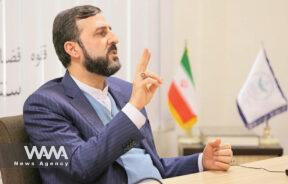Details of the Start of the Third Round of Iran-U.S. Talks
WANA (Apr 26) – The third round of negotiations between Iran and the United States began earlier today, with delegations from both sides present. This round of talks is more extensive in terms of the number of participants compared to previous rounds. According to American news sources, the U.S. delegation consists of around 12 members.
The discussions, which include technical experts, are being led on the Iranian side by Mr. Seyed Abbas Araghchi, Iran’s Deputy Foreign Minister. Among the Iranian delegation are experts in sanctions relief, highlighting that one of the main focuses of these talks is achieving “effective” sanctions removal—an issue repeatedly stressed by the Iranian Foreign Ministry spokesperson.
The emphasis on the term “effective” reflects Tehran’s sensitivity to past experiences with sanctions relief. Iran insists that any lifting of sanctions must go beyond statements and be implemented in a verifiable and practical manner. Drawing on previous experiences, the Iranian negotiators are seeking assurances to ensure that the opposing side’s commitments can be verified.
Currently, the two delegations are still in discussion, and what matters most is assessing the genuine willingness of the United States to practically lift the sanctions—an issue that could significantly impact the course of the negotiations.
Iran’s Foreign Ministry spokesman, Esmail Baghaei, dismissed claims by some Western media, stressing that Iran’s defensive and missile capabilities have not been, and are not, a subject of the indirect talks with the U.S.
While these talks were previously referred to as “indirect negotiations in Muscat,” the beginning of real exchange and technical discussions between experts has now led to the use of a more precise term: “Iran-U.S. negotiations mediated by Oman,” as the talks have entered a more serious and interactive phase.
Latest developments in Iran–U.S. negotiations:
1. Trump, after a phone call, announced full agreement with Netanyahu on all issues.
2. U.S. Secretary of State Rubio has called for dismantling uranium enrichment in #Iran and importing fuel for power plants.
3. Witkoff, the #US… pic.twitter.com/hZ4frmBtuq
— WANA News Agency (@WANAIran) April 26, 2025
Read More:
The third round of talks between Iran and the United States will begin today at noon in Muscat, Oman, with Omani mediation playing a central role. Prior to the high-level negotiations, technical-level discussions are being held between the two sides to lay the groundwork for the main topics.
These confidential talks aim to reduce tensions and explore ways to return to a possible agreement, focusing primarily on nuclear issues, sanctions, and regional security.
Oman is playing a key role by relaying messages between the Iranian and American delegations, facilitating a secure and indirect communication channel. This method has been used in previous negotiations to create a less confrontational environment for dialogue.
Despite major differences over Iran’s nuclear program, sanctions, and missile activities, analysts believe that both Tehran and Washington are in a position where even a temporary agreement may be necessary. Iran’s economic challenges and internal political pressures in the U.S. could drive both sides toward compromise, though the path remains difficult and uncertain.
The Iranian diplomatic and expert delegation held talks in Muscat ahead of official negotiations.
The third round of indirect talks between #Iran and the #UnitedStates begins today at noon in Muscat, Oman, with Omani mediation. pic.twitter.com/Y9XeIHmldN
— WANA News Agency (@WANAIran) April 26, 2025












